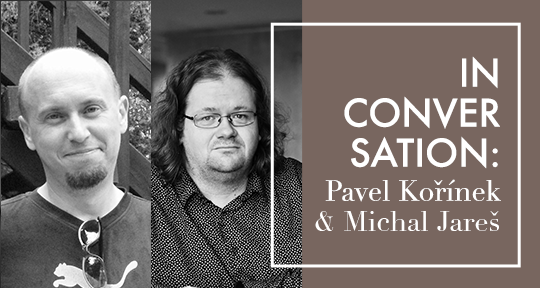After decades of being dismissed as trash or a genre suitable only for children, comic books and graphic novels have begun to gain recognition in the Czech Republic and Slovakia, becoming the subject of serious scholarly interest and major retrospective exhibitions. Comic art now has an established infrastructure, with an annual prize, the Muriel Award, a Centre for Comics Studies (at the Department of Media and Cultural Studies at Palacký University, Olomouc), and an international comic art festival, Frame, in Prague. In the second of our interviews on comic art, Asymptote’s editor-at-large Julia Sherwood asked two of the Centre’s associates and noted experts Pavel Kořínek and Michal Jareš to introduce our readers to this art form and its leading Czech and Slovak proponents.
Julia Sherwood (JS): You and your colleagues have written widely on all aspects of comic art, from reviews to historical and theoretical articles and essays, including V panelech a bublinách (In Panels and Speech Balloons), published in 2015, the first detailed Czech work that summarizes the various theories and concepts around comic art, which you co-authored with Martin Foret. So to begin with, how would you define the genre?
Pavel Kořínek (PK): The million-dollar question, and straight off, too. There are, of course, many definitions of comics, and new ones are being added all the time. We can revel in Scott McCloud’s definition of comic art as “juxtaposed pictorial and other images in deliberate sequence, intended to convey information and/or to produce an aesthetic response in the viewer”; we can talk about sequentiality and the dominance of the sequential image primarily in the context of print media; we can reconcile ourselves to the fact that there is nothing that can be defined as being specific exclusively to comics; and we can talk about comics as whatever we (or, ideally, some higher institutional authority, by consensus) declare to be comics. After all, we all sort of subconsciously know “what a comic is” (we just don’t know if it’s actually a genre—and in what sense—a medium, a form, or what). It’s only when we look more closely that we begin to encounter more complicated cases: works that may be related to comics, for example, but don’t quite seamlessly fulfill our ideas of what comics are. In our book, we ended up approaching the question of definition as an open-ended challenge: we offered several influential approaches and tried to convey to the reader our conviction that “comics”—while being aware of all that has been said formally and functionally, socially and institutionally—as a genre is something fluid, evasive, and ever-evolving rather than a fixed category. Fortunately. Otherwise, it would have been a staggering bore.
JS: Your monumental Dějiny československého komiksu 20. století (History of Czechoslovak Comics in the 20th Century, co-authored with Martin Foret and Tomáš Prokůpek), published in 2014, details across almost one thousand lavishly illustrated pages on how the turbulent history of Europe over the past century has affected the development of the genre. Difficult as this task may be, could you outline the main stages and how they were shaped by the political events from the early days until World War; under the interwar Czechoslovak Republic, during World War II; under communism; and after its fall?
Michal Jareš (MJ): Talking about something that is new and still evolving, such as a “possible” history of Czechoslovak comics, we also have to bear in mind the history of Central Europe as a whole, particularly in our neck of the woods, from the time of Austria-Hungary to the foundation (and later dissolution) of Czechoslovakia. We also have to consider it within the context of the debates and trends that shaped all of twentieth-century art, including the avant-garde. We constantly encounter attempts to understand comics as well as attempts to forbid them, and attempts at innovation as well as attempts to stay within the educational form of comics. So, at the very beginning we can see a clear continuation of the tradition of Central European caricature and thus topics aimed at the adult reader as well. The development of magazines for children and youth spawned a variety of children’s comics featuring humorous animals (such as the children’s magazine Punťa). READ MORE…





